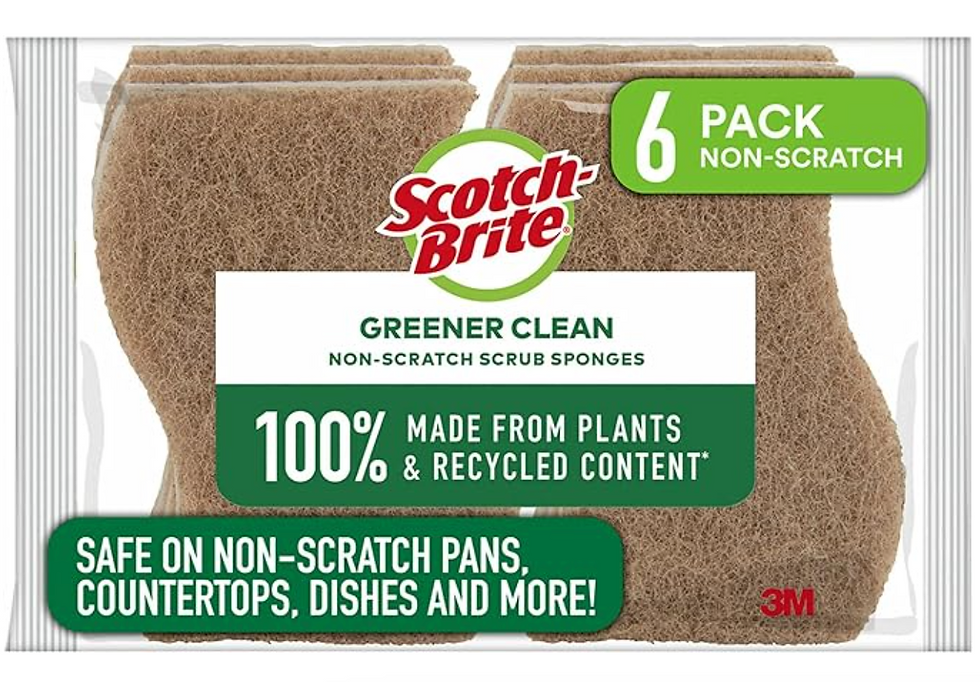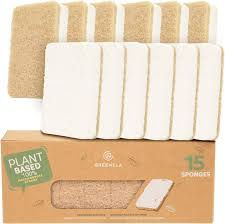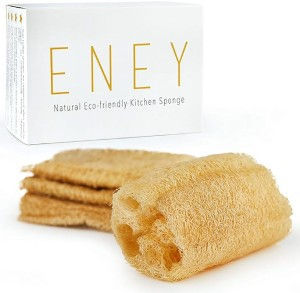10 Eco-Friendly Kitchen Cleaning Sponges that You Can Almost Love
- Olga Shavrina

- Jan 2, 2024
- 3 min read
Updated: Mar 2
When somebody says 'kitchen sponge,' I still immediately picture a yellow polyurethane foam sponge with a dark green scouring pad. It was an irreplaceable element in my kitchen for so long. Too long! We often get used to these everyday products and don't realize that by sticking to them, we harm the environment because both their production and utilization are planet-UNfriendly.
An additional problem with scrub sponges is their short 'career' - two to three weeks and then off to the landfill where they slowly and painfully decompose, releasing harmful substances. Brr...
It's no surprise that eco-friendly alternatives are gaining popularity. Options like biodegradable cellulose kitchen sponges made from wood fibers, reusable cloth sponges, and scour pads made from natural materials like coconut or hemp are popping up in stores. And they are not just nature-friendlier. They also look and feel more pleasant and natural.

Important note! Some sponges are labeled as eco-friendly and claim to be made from recyclable materials (often still plastic), but this doesn’t mean they are biodegradable or compostable. While they're better than traditional toxic sponges, they may still end up in landfills and pollute the environment for centuries.
For example:
Scotch-Brite Greener Clean Scrub Sponges ❌ Not compostable! ❌ Plastic packaging! |
Here’s a collection of compostable sponges in eco-friendly packaging:
Choose according to shape, color, and price :) I prefer the rectangular one with natural colors. It's more efficient to produce, making it more eco-friendly. Additionally, it looks natural and enhances the overall sustainable look and feel of the kitchen. Lately I've been using Greenzla sponges. They are nice, not expensive and do their job.
The Scrub-it sponges – green ones on the right – are the cheapest option, priced at only $0.87 per unit.
Frequently Asked Questions About Eco-Friendly Kitchen Sponges
What materials are eco-friendly sponges made from?
Eco-friendly sponges are typically made from natural and renewable plant-based materials such as cellulose (derived from wood pulp), loofah, coconut, or hemp fibers. These materials have a lower environmental impact compared to synthetic sponges made from plastic or polyester.
How long do eco-friendly sponges last compared to traditional ones?
Eco-friendly sponges generally have a comparable lifespan to traditional sponges, often lasting several weeks depending on usage. Sponges made from natural fibers like loofah or hemp may last slightly less.
How to make a scrub sponge last longer?
To extend the life of your scrub sponge, rinse it thoroughly after each use. Keep it dry to prevent bacteria growth, and store it in a well-ventilated area. You can also sanitize your sponge periodically by boiling it, microwaving it (when wet), or soaking it in a vinegar or hydrogen peroxide solution.
Do eco-friendly sponges resist bacteria and odors?
If kept dry and regularly sanitized, eco-friendly sponges are quite resistant to bacteria and odors. Materials like cellulose and loofah have a lot of air between fibers, which helps them dry quickly and prevents bacteria growth and odors.
Can eco-friendly sponges be recycled?
Most eco-friendly sponges are plant-based and not suitable for conventional recycling. Some sponges made from recycled plastic materials may be partially recyclable but might need to be taken to a special facility. Always check the manufacturer's guidelines for proper disposal options.
Can sponges be composted?
Yes, that’s the main advantage! Plant-based eco-friendly sponges can and should be composted. They will break down in a composting environment, returning to the soil without leaving harmful residues.
Are these sponges safe for use on all surfaces?
Yes, most eco-friendly sponges are safe for use on various surfaces, including non-stick cookware, glass, and countertops. However, always check the packaging for specific recommendations and test on a small, inconspicuous area first, especially with more delicate surfaces.
Alternative Eco-Friendly Kitchen Sponges
If you want your kitchen look even more cozy, consider these natural-looking sponges. They are biodegradable and perform their job just fine. On average they are more expensive, but JOYMOOP and eplanita offer quite affordable options - less then $2 per unit.
And last but not least, not everything can be cleaned with a dish sponge. Sometimes a paper towel or a cloth is more handy. Make sure you choose sustainable options that are great for both the environment and your household.
#️⃣ Tags: Green cleaning












